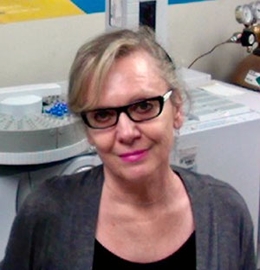Centralized Research Instrumentation Core
The CRI Core integrate and empower faculty investigators, students and postdoctoral associates from the Lead, Primarily Undergraduate Institutions (PUIs), and Outreach Institutions to work in interdisciplinary areas of research by providing them with scientific consulting for experimental design, technical support, data analysis, and collaborative support.
The PR-INBRE CRI incorporate core facilities supported by PR-INBRE and other collaborating facilities supported by National Institutes of Health (NIH) infrastructure programs such as the National Institute on Minority Health and Health Disparities (NIMHD) RCMI program, or with institutional funds.
CRI Services
Chemtox
The ChEMTox Biotesting Facility at Universidad Metropolitana (UMET) affiliated to the School of Environmental Affairs provides services for the toxicity testing of novel and natural substances on human or animal cell cultures. It supports scientist in drug development interested in characterizing the mechanism of action of natural products, novel materials or environmental contaminants.
The laboratory is also a CORE facility for researchers from the PR-INBRE program (UPR-NIH funded). Local scientists as well as scientists from the National Cancer Institute in the US have used our in-vitro testing services.
Our Services:
Toxicological assays for novel drugs/materials, natural products or environmental substances include:
- Determination of 50% Inhibition concentration (IC50)
- Apoptosis Annexin V assay-
- Mitochondrial Permeability JC1 • Caspase 7, 3, 8 and 9
- Cell Cycle arrest
- DNA Fragmentation
- Autophagy cell death
- Bacterial growth inhibition
- Fluorescent microscopy
- Flow cytometry analysis
- Hypoxic markers
Quotes and Information:

Dr. Beatriz Zayas
Ana G Méndez University
http://umet.suagm.edu/chemtox_lab
787-766-1717 x6460, 6462
bzayas@suagm.edu
Metabolomics
Metabolomics Research Core (MRC) was established by NCRR/INBRE funding in the fall of 2011. Dr. Nataliya Chorna serves as the core facility director. The MRC offers scientific and technical support via metabolomics service, scientific seminars and training workshops for students and researchers in Puerto Rico with the aim to disseminate knowledge of metabolomics technology through the biomedical research community on the island and beyond.
The MRC is equipped with a GCMS-QP2010 Plus quadrupole and GCMS/MS-TQ8050 triple quadrupole (Shimadzu Inc) supplied with NlST/EPN NlH 2008 and Willey GCMS Mass Spectral Libraries. The facility has the resources and small appliances for metabolite extraction, evaporation and derivatization.
Quotes and Information:

Dr. Nataliya Chorna
UPR-Medical Sciences Campus
(787) 758-2525 Ext. 1602
nataliya.chorna@upr.edu
Proteomics
The Translational Proteomics Center provides training, resources, and tools for new and established investigators seeking to use innovative approaches of proteomics to their research.
Services available
- Protein extraction and purification. We provide training and suggestions regarding protein extraction and preparation from a specific biological specimen or experimental sample (different types of tissue, blood, urine, cerebrospinal fluid, tissue culture, cells suspensions, purified and recombinant proteins in solution) in consonance to the proteomic approach the investigator would like to pursue.
- Protein separation. Sample separation technique such as one- (1D) gel electrophoresis is available at the Center.
- We offer the service of immunoprecipitation of your protein of interest and evaluate possible protein-protein interactions.
- Sample Processing for Mass Spectrometry. In gel-digestion using Trypsin and peptide extractions are services available at the Center for further sample processing, to either identify or relatively quantify proteins.
- Protein identification. A top notch Easy-nano LC 1000 couple to LTQ XL mass spectrometer from Thermo Scientific is available and configured for maximum coverage in protein identification.
- Quantitative Proteomics. We are currently in the process of incorporating a new Q-Exactive Plus instrumentation for the analysis of tagged samples and other quantitative proteomics methodologies. Available techniques to be used for this instrument: Isobaric Tag for Relative and Absolute Quantitation (iTRAQ), Tandem Mass Tag (TMT) System, and Stable Isotope Labeling with Amino Acids in Cell Culture (SILAC).
- Post-translational modification analysis. In our interest to provide methods to study post-translational modifications we are in the process of incorporating phosphoproteomics analysis by mass spectrometry.
- Validation Analyses. The Center provides equipment as well as the services for western blotting, ELISA, fluorometric and luminometric detection technologies for direct protein expression validations. Investigators are responsible for supporting funds for specific antibodies and reagents.
Quotes and Information:

Dr. Loyda Meléndez
UPR-Medical Sciences Campus
http://rcmi.rcm.upr.edu/resreso/corefacnetwork/tpc
(787) 758-2525 ext 2816
(787) 758-2525 ext. 2818
loyda.melendez@upr.edu
Genomics
The long-term goal of the Center for Genomics in Health Disparities and Rare Diseases (CGHDRD) is to provide the critical environment that will enable high quality translational and biomedical research in pharmacogenomics, human genetics and genomics, molecular biology. We aim to develop and strengthen a collaborative research environment by providing research infrastructure that supports the focal areas of research at the University of Puerto Rico Medical Sciences Campus (UPR-MSC), which encompass common diseases such as cancer, neurological and cardiovascular disorders as well as rare disorders, by improving the human and physical resources.
The Center focuses these initiatives on externally funded, interdisciplinary, collaborative projects which enhance the quality of translational, biomedical and clinical research at the Medical Sciences Campus linked to health disparities and rare disorders in Puerto Rico and nationally. Collaborations with researchers at institutions outside of Puerto Rico or other RCMI institutions, as well as other academic units in the island and in the UPR system are encouraged.
Quotes and Information:

Dr. Carmen L. Cadilla
UPR-Medical Sciences Campus
http://rcmi.rcm.upr.edu/resreso/corefacnetwork/cghdrd
(787) 758-2525 Ext. 1638, 1372
carmen.cadilla@upr.edu
Sequencing and Genotyping
The SGF was officially created in 2006 through a combination of funds from different grants, including NCRR AABRE Grant #P20 RR16470, NIH-SCORE Grant #S06GM08102, NSF-CREST Grant #0206200, and NINDS-SNRP U54 NS39405 and institutional matching funds. The main goal of the SGF is to provide researchers, students and faculty from Puerto Rico and the Caribbean access to state-of-the-art equipment, technology and technicians who are committed to helping investigators produce the highest quality data.
Presently, the SGF is the largest and most active genomics facility in Puerto Rico. The Sequencing and Genotyping Facility (SGF), is designed to:
1) provide students and researchers in Puerto Rico with access to advanced equipment for collecting high-quality automated sequence and genotype data
2) training and advising researchers and students island-wide on how to obtain, archive, and analyze data
3) create an alliance of researchers and students who share core research technology and who work together to strengthen scientific infrastructure and research competitiveness within Puerto Rico.
The SGF will introduce hands-on training and technical aspects of NGS technology to the existing UPR Rio Piedras, Department of Biology Laboratory of Genetics (Biol 3350) course, currently offered to undergraduate biology students at the UPR Rio Piedras Campus. The SGF will continue to provide support in the preparation and submission of grant applications to the NIH, National Science Foundation (NSF), the National Aeronautics and Space Administration (NASA), the US Department of Agriculture (USDA), and other agencies to INBRE network users and will continue to provide support for the preparation of scientific, peer-reviewed manuscripts
Quotes and Information:

Dr. Ricardo Papa
UPR-Rio Piedras Campus
(787) 764-0000 Ext. 88133, 88145
riccardo.papa@upr.edu
Our Staff
Meet PRINBRE Cores Directors and Staff Members
